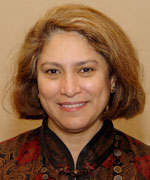Observation
A Presidential Objective

Mahzarin Banaji
“APS and I have grown up together,” says APS President Mahzarin Banaji, “I was a young assistant professor handing out APS buttons in 1988 because I knew something important was happening that would have influence on me and my science.” As APS continues into its third decade, Banaji’s instinct has been proven right: “APS has become the place to which the world turns when it needs to know what psychology says on any topic of importance,” she says. “It is also impossible to read any newspaper in the world and not see in the reports of local, national, and world events stories to which the work of our field speaks clearly and loudly.”
As such, Banaji will continue to build this interplay between science and the public during her presidential year, to see that “APS [is] actively involved in helping to enhance the world’s store of psychological knowledge and to participate in its dissemination.” While engaging the public allows applied psychological research to inform myriad social and health issues, it also ensures continued funding for basic research. Banaji aims to “do all [she] can to make it possible for those doing the smallest and grandest basic research to continue to do so without jeopardy…We must find ways in which the best work can ultimately reach the funding public and there’s no alternative to basic research.”
Banaji also points to the important role of APS’s entire membership in bringing psychological research to the forefront, stating that “none of these goals is achievable if only a thin slice of the membership is involved. I would like to find ways to make APS support and enable its members who are committed to speaking to a science-hungry global society.” As President, Banaji is looking forward to exploring the “ways in which the deep expertise of APS’s membership as a whole can be deployed in the service of science and society.” Throughout her career, Banaji has been a model of this service, both in speaking publicly about her research and in supporting scientific societies like APS. A few years after her initial grassroots efforts on behalf of APS, three APS presidents — Marilynn Brewer, Elizabeth Loftus, and Kay Deaux — invited her to be involved in the organization. She served on the APS Convention Program Committee from 1993-1995 and as APS Secretary from 1997-1999.
Banaji was born and raised in India, received her PhD from The Ohio State University with Tony Greenwald and was a postdoctoral fellow at the University of Washington in Seattle with Elizabeth Loftus and Claude Steele. From 1986-2001, she was at Yale University where she was named Rueben Post Halleck Professor of Psychology. She is currently Richard Clarke Cabot Professor of Social Ethics in the Department of Psychology at Harvard University, where she also served as the first Carol K. Pforzheimer Professor at the Radcliffe Institute for Advanced Study from 2002-2008.
Her internationally renowned research in social cognition is centered on how unconscious mental processes operate and shape assessments of both ourselves and others. Along with Brian Nosek and Anthony Greenwald, Banaji developed the Implicit Association Test (IAT), which measures the strength of mental associations through timed tasks and has applied it to the study of social group preferences and beliefs. Since 1998, the three have managed Project Implicit, a web resource for both researchers and the public containing information regarding unconscious biases and implicit cognition.
Banaji has received numerous awards and honors for her contributions to the field. Among these are Yale’s Lex Hixon Prize for Teaching Excellence, a James McKeen Cattell Fund Fellowship, a Guggenheim Memorial Foundation Fellowship, the Morton Deutsch Award for Social Justice, the Gordon Allport Intergroup Relations Prize, an APA Presidential Citation, and the Carol and Ed Diener Award for Outstanding Contributions to Social Psychology. She was elected to the American Academy of Arts and Sciences (AAAS) in 2008 and was named Herbert A. Simon Fellow of the American Academy of Political and Social Science in 2009. ♦





APS regularly opens certain online articles for discussion on our website. Effective February 2021, you must be a logged-in APS member to post comments. By posting a comment, you agree to our Community Guidelines and the display of your profile information, including your name and affiliation. Any opinions, findings, conclusions, or recommendations present in article comments are those of the writers and do not necessarily reflect the views of APS or the article’s author. For more information, please see our Community Guidelines.
Please login with your APS account to comment.